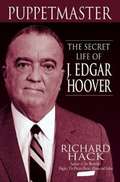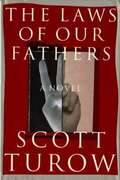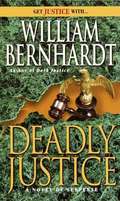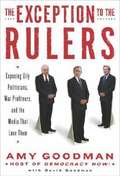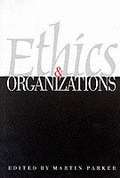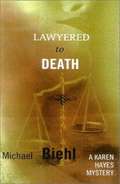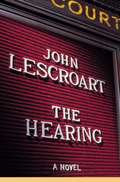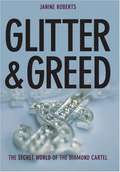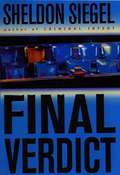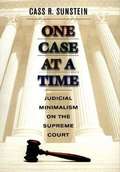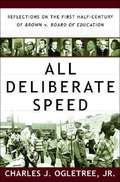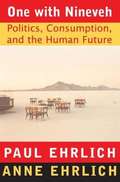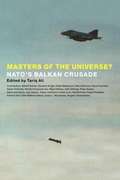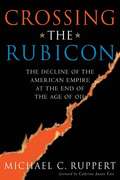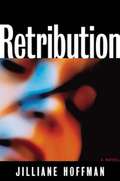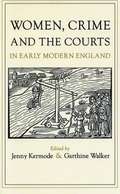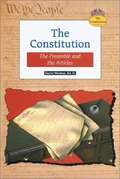- Table View
- List View
Puppetmaster: The Secret Life of J. Edgar Hoover
by Richard HackBiography of the former FBI director, who led and influenced it for so many years.
The Laws Of Our Fathers
by Scott TurowThe novel opens with a spectacular drive-by shooting in one of Kindle County's notorious drug-plagued housing projects. The victim is an aging white woman who has been seen there before; within days her son, Nile Eddgar, a probation officer, is charged in connection with the crime-and the reader gratefully once more under the hypnotic spell that only Scott Turow can cast. Nile's trial is presided over-and narrated-by Judge Sonia "Sonny" Klonsky, whom his fans will remember from his second novel, The Burden of Proof. It brings together a vivid cast of characters from Sonny's student years during the turbulent sixties, among them Nile's father, Loyell Eddgar, once a leading campus revolutionary, and Sonny's old boyfriend Seth Weissman, who is now a renowned journalist. All have been permanently marked by the heady iconoclasm of their youth; some carry terrible secrets that come to bear on the case at hand in unforeseeable and explosive ways. Scott Turow's most powerful novel to date,
Deadly Justice (Ben Kincaid Series #3)
by William BernhardtA young lawyer finds himself as a murder suspect trying to clear his name while in the midst of working for a crooked law firm. A tale of jealousy, justice and blood money.
Crusaders in the Courts: How a Dedicated Band of Lawyers Fought for the Civil Rights Revolution
by Jack GreenbergStory of the NAACP Legal Defense Fund
The Exception to the Rulers: Exposing Oily Politicians, War Profiteers, and the Media that Love Them
by Amy Goodman David GoodmanHost of Pacifica Radio's Democracy Now! Analyzes world events.
Ethics and Organizations
by Martin ParkerA compilation of academic articles on the connections between ethics and businesses, as well as other organizations.
Lawyered To Death: a Karen Hayes mystery
by Michael BiehlThe successful CEO of a Midwest hospital, begins an affair with a hospital receptionist, unaware that she and her husband, are setting him up for an embarrassing and costly sexual harassment claim
The Hearing (Abe Glitsky #3)
by John LescroartThe call comes at midnight. It looks like a tragic and petty murder-a rising star in San Francisco's legal firm found shot in a dark alley. But for homicide lieutenant Abe Glitsky, the crime cuts horribly close to home--unknown to anyone, the victim was his daughter. Seething, Glitsky leans hard on his only suspect--a homeless heroin addict found lingering over his daughter's body, with her jewelry in his pocket and a smoking gun in his hand. The city's embattled, ambitious D.A., Sharron Pratt, sees an opportunity to revive her troubled administration by publicly declaring war on the killer and vowing to deliver the death penalty, putting the case on the fast track to certain conviction. Unable to watch a man die for Pratt's political gain, Dismas Hardy warily takes on the defense. But as Hardy's crusade to secure his client a fair hearing ensues, a lethal web of political corruption, legal conspiracy, and cold blooded murder begins to unravel. In a case that would send shock waves through the city of San Francisco and echo in the private lives of its citizens, the hearing is just the beginning.
Glitter and Greed
by Janine RobertsThe result of 20 years research on the diamond trade and De Beers, this book reveals the myths and misinformation in the industry.
Final Verdict
by Sheldon SiegelFate throws a curveball at the San Francisco ex-husband-and-wife legal team of Mike Daley and Rosie Fernandez, when Mike picks up the phone and hears the voice of Leon Walker. This is not good news-because Walker was the one who ruined their marriage. Years ago, he and his brother participated in a stickup that left a man dead. Through a series of (some said) questionable maneuvers, Mike got the charges dropped, but he and Rosie fought about it all the time and it finally drove a wedge between them. Now, a Silicon Valley venture capitalist has been found dead in a dumpster on San Francisco's skid row. The new murder has been pinned on Walker, but he not only tells Mike he is innocent, he says he is a dying man and doesn't want to go to his grave proclaimed a murderer. Dogged investigation, courtroom nimbleness, and a healthy dose of luck usually have helped Mike before, but it looks like it'll take more than that to prevail this time, and his time is running out-both on his client and, just maybe, on his partnership. Filled with wonderful characters and suspense and more than a touch of humor, Reasonable Doubt is, like the author's first three books, a page-turner. S
One Case at a Time: Judicial Minimalism on the Supreme Court
by Cass R. SunsteinExplains and documents legal minimalism
All Deliberate Speed: Reflections on the First Half Century of Brown V. Board of Education
by Charles J. Ogletree Jr.Legal cases and actions since Brown.
One With Nineveh: Politics, Environment, and the Human Future
by Paul R. Ehrlich Anne H. Ehrlich"Through lucid explanations, telling anecdotes, and incisive analyses, the eminent scientists Paul Ehrlich and Anne Ehrlich here spotlight the three elephants in our global living room--rising consumption, increasing world population, and unchecked political and economic inequity--that together are increasingly shaping today's politics, undermining the planet's ability to sustain us, and determining humankind's future. The result is a book that brilliantly puts today's policy debates in a larger context and makes a compelling case for the critical discussions that we should be having." (From the book jacket.)
Masters of the Universe: NATO's Balkan Crusade
by Tariq AliNATO’s war on Yugoslavia in the spring of 1999 was unleashed in the name of democracy and human rights. This view was challenged by the world’s three largest countries, India, China and Russia, who saw the bombing of Serbia and Kosovo as a naked attempt to assert US dominance in an unstable world. In the West, media networks were joined by substantial sectors of left/liberal opinion in supporting the war. Nonetheless, a wide variety of figures emerged to challenge the prevailing consensus. Their work, gathered here for the first time, forms a collection of key statements and anti-war writings from some of democracy’s most eloquent dissidents—Noam Chomsky, Harold Pinter, Edward Said and many others—who provide carefully researched examinations of the real motives for the US action, dissections and critiques of the ideology of ‘humanitarian warfare’, and chartings of the unnecessary tragedy of a region laid to waste in the pursuance of Great Power politics. This reader presents some of the most important texts on NATO’s Balkan crusade and forms a major intervention in the debate on global geo-political strategy after the Cold War.
The Lie Direct
by Sara WoodsA client of Antony Maitland is accused of murder and of living a double life with two wives. He's guilty of neither, but Maitland can get him free only if the psychological gambles he takes in the court room go his way.
The Dog Who Couldn't Wag his Tail
by Linda AdkinsWhen his rescuer saw him on the side of the road, the poor swollen dog, needed a lot of help. He had terrible ear mites, and no hair except for a couple of tufts on his face. The dog could not even wag his tail. But with some kind caring vets and a chance to get better [and] learn a few tricks, "Mighty Mite," a golden retriever mix, was able to make a difference as a blood donor for other animals in need and as a therapy dog. This is his true story.
Crossing the Rubicon
by Michael C RuppertThe Rubicon signifies a point of no return. Peak Oil and 9/11 are two such points that signal so profound a change in the course of world events that no one will remain unaffected. The attacks of September 11, 2001 were accomplished through an amazing orchestration of logistics and personnel. Crossing the Rubicon discovers and identifies key suspects - finding some of them in the highest echelons of American government - by showing how they acted in concert to guarantee that the attacks produced the desired result. A superbly detailed scrutiny of the events of 9/11, the book also ranges across the terrain of rapidly diminishing hydrocarbon energy supplies, geopolitics, narco-traffic, intelligence and militarism - without which 9/11 cannot be understood. Crafted as a criminal investigation of a homicide, Crossing the Rubicon examines: * the motives for the 9/11 attacks, including the Pentagon's need for a pretext for war that would enable an all-out drive for the planet's last reserves of oil and gas; Wall Street's need for liquid cash from restored traffic in Afghani heroin; and the administration's need for legal domestic repression during severe and imminent resource shortages; * the personnel, including Dick Cheney, the Pakistani Intelligence Agency (ISI), the Taliban, al Qaeda, the bin Ladens and elements of the government of Saudi Arabia: * the intelligence, including covert software, the full complexity of the US intelligence community, the connections with Wall Street and the Israeli government; * the carefully designed opportunity on the day of the attacks, the role of the Secret Service and the US Vice President: * the coverup; and * the outcome: "The War on Terror" as pretext for the loss of US civil liberties and domination of world oil reserves. ...at the end of three years of conducting a really independent investigation, Ruppert is not only heading in the right direction, but also touching the inner sanctum of the hidden government agenda. --Andreas von Bulow, former German Cabinet Minister & Parliamentary Secretary MICHAEL RUPPERT is the Publisher/Editor of From the Wilderness, a newsletter read by more than 16,000 subscribers in 40 countries. A former LAPD narcotics investigator, he is widely known for his groundbreaking stories on US involvement in the drug trade, Peak Oil and 9/11.
Retribution
by Jilliane HoffmanWhen an elite prosecutor faces the most lethal predator she's ever encountered, it all comes down to a choice between justice...and retribution Prosecutor C.J. Townsend is a talented state prosecutor in Miami, well-known within law enforcement and judicial circles for her ability to handle even the most horrific cases - without losing her cool. Her experience in prosecuting violent sex-crimes has resulted in her to rise to second-in-command at the Miami-Dade State Attorney's Office where she has a reputation for going strictly 'by-the-book'. For the past year, C.J. has been involved in the investigation of a series of shocking murders that have taken place in Miami. When a speeding motorist is pulled over and police discover the mutilated body of a young woman in the trunk of the car, it appears that the case is finally solved. Despite the maelstrom of publicity, she begins to build her court case, piece by careful piece. But C.J. has personal demons that she's never revealed to the world. Now, when she needs to be at the top of her game, a terrible incident from her past is resurfacing. As she battles the evil incarnate in court, she is also fighting the devil inside - struggling to resolve the conflict between the events of her past and her duty and integrity as a prosecuting attorney. On top of everything else, the lead detective on the case is one who has hinted that he has begun to care for her as much as more than just a colleague. And everything is riding on her ability to put this killer behind bars. . !
The Supreme Court: Into the Third Century
by Richard Bernstein Jerome AgelA history of the Supreme Court which explores such ideas as judicial review and federalism, introduces people who have shaped our history and our law, and assesses the modern Supreme Court.
Women, Crime, and the Courts in Early Modern England
by Jennifer Kermode Garthine WalkerRecent years have witnessed a considerable body of published research on both crime and women in the early modern period. There have been few attempts, however, to synthesize such studies and to examine in detail the relationship between the law and women's lives. This collection of seven original essays explores that relationship by examining the nature and extent of women's criminal activity and surveying the connections between women, their legal position, and their involvement in legal processes. The words, actions, and treatment of women who came before the courts as plaintiffs, defendants, and witnesses are examined here in a variety of contexts, ranging from the assertion of a variety of rights to scolding, thieving, and witchcraft. The contributors demonstrate that women were far from passive victims in a male-dominated legal system. As both breakers of the law and important agents of its enforcement, women were far more assertive than their formal legal positions would suggest. The contributors are Garthine Walker, Jenny Kermode, Laura Gowing, Martin Ingram, Jim Sharpe, Malcolm Gaskill, Geoffrey L. Hudson, and Tim Stretton.
The Constitution
by Daniel WeidnerExplores the preamble and individual articles of the United States Constitution, as well as how this important document was written, how it has developed through the years, and how it is enforced
